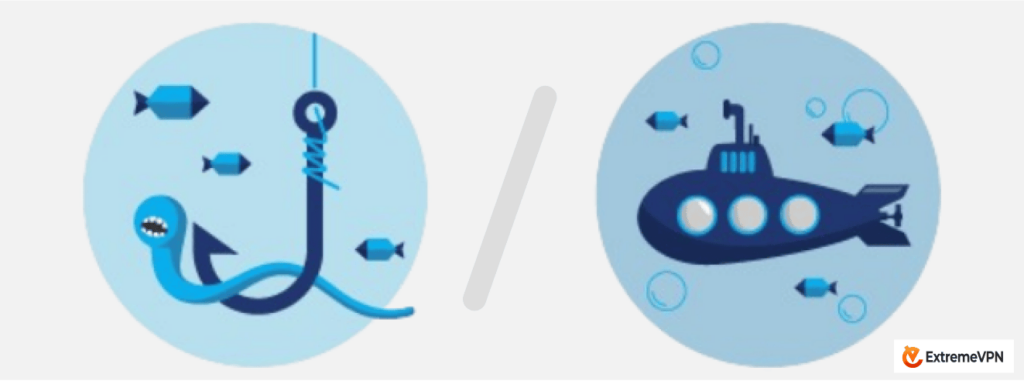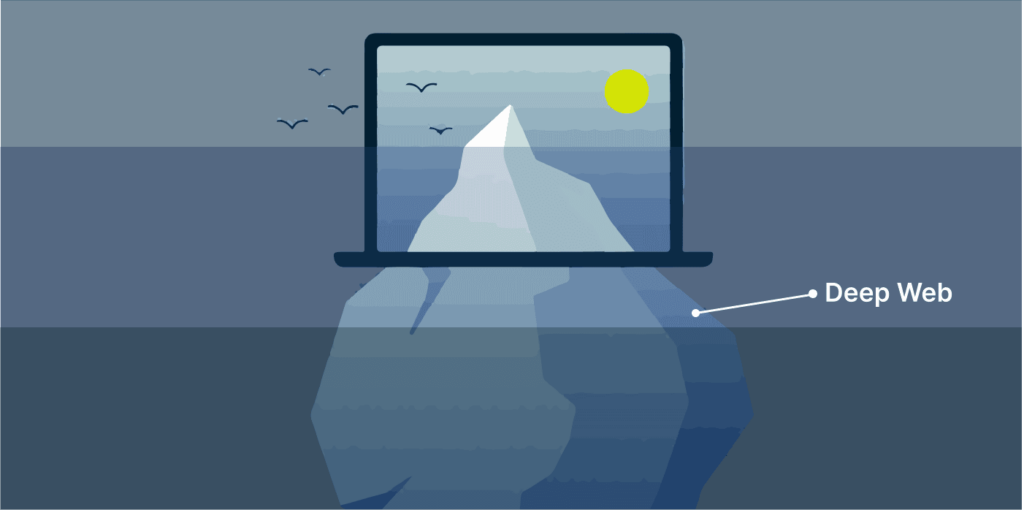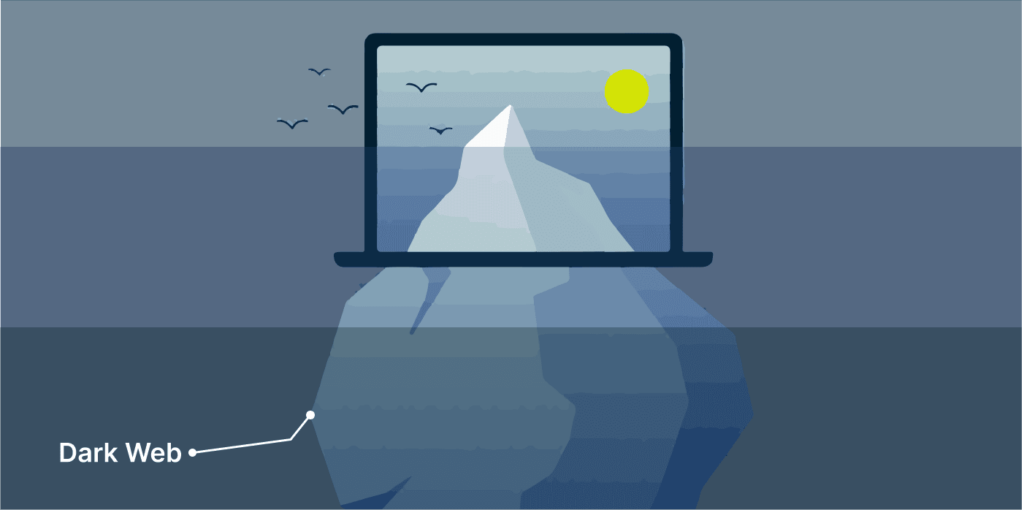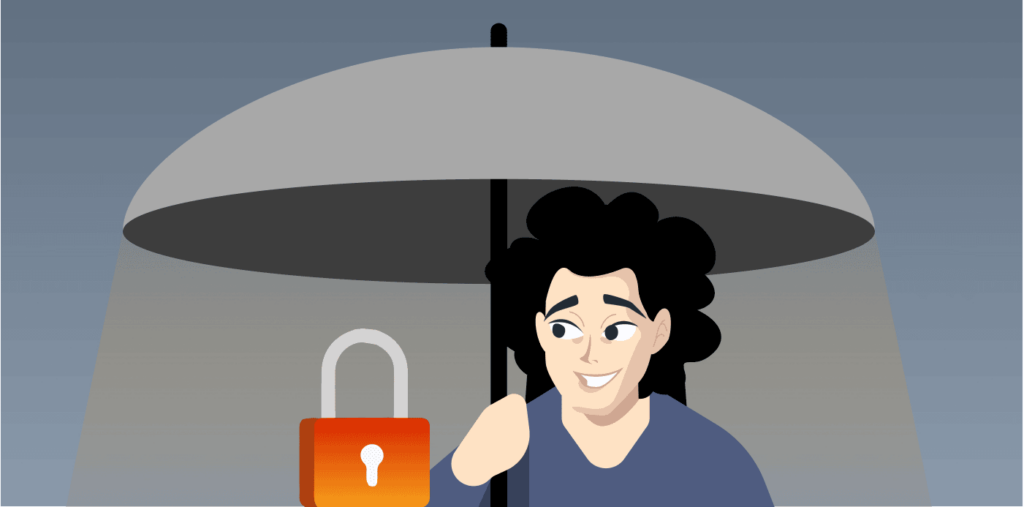The Internet is a large space filled with millions of web pages, servers, and databases running nonstop daily. In fact, the portion of the Internet accessed using search engines like Google and Bing is just the surface. Below this surface exists the deep web and the dark web.
While most internet users often use the dark and deep web interchangeably, both terms have different meanings. The deep web houses online content you can’t access through any search engine, whereas the dark web requires you to download a special onion browser, Tor, before you can access it.
If you are curious about the differences between these two terms, you are in the right spot. This post clearly defines the dark and deep web. You will also find a guide on protecting your online traffic while browsing on either of them.
Deep Web vs. Dark Web: 5 Key Differences

As mentioned earlier, people often confuse the dark and deep web as the same thing. Here’s a brief run-through of their differences according to various aspects:
| Deep Web | Dark Web | |
|---|---|---|
| 1. Security | Most online threats involve stealing your login credentials using various tricks like email phishing. | The risk occurs when you download illegal files that contain malware or viruses. |
| 2. Applications | You use it for free services like Gmail, social media accounts, and subscription-based platforms like Hulu and Netflix. Companies or institutions also use it for their intranets. | It is used mostly for whistle-blowing, expressing varying opinions, and criminal activities. |
| 3. Size | It is much bigger than the surface web. | It only contains approximately 5% of the internet and 0.01% of the deep web. |
| 4. Operations | You don’t need a particular browser or protocol to access it. But you will need a password or login credentials. | You can’t access it without using a browser like Tor, which aims to ensure user anonymity. |
| 5. Scope | It has a broader scope than the dark net, containing a wide content range you can’t access by search engines. | It is a subset of the deep web; hence, it has a much narrower scope. |
Want to know more about these differences? Below, we’ve provided a detailed explanation.
What is the Deep Web?

We can define the deep web as the section of the internet you can’t browse with a search engine like Google. You can also refer to it as not-indexed pages, as they are web pages that are not included in a search index.
This means they mostly don’t appear in search results, no matter your keyword. These web pages are mostly masked behind some access control, like a code word or log-in.
Examples of Deep Web
Fun fact? You’ve used the deep net more times than you realize. Everything from your Email inbox to your Dropbox is an example of you using this web page, as you don’t need a public domain before you can access it.
More examples include your social accounts’ settings page, subscription content platforms like Netflix, and bank account pages. All these web pages exist in records that search engines like Google can’t crawl.
What is the Dark Web?

The dark web is a well-hidden portion of the deep web. It contains a collection of websites you can only access using a particular browser. All activities performed here remain anonymous automatically, as this is where some of the dubious internet transactions happen.
According to some King’s College London researchers, a study examined the activities performed on up to 2,700 dark websites. It stated that up to 60% of these sites host illegal content. However, you can use the dark net to access legal sites.
If you want to browse on the darknet, you need unique search engines such as Candle, Searx, and Not Evil.
Examples of Dark Web
The dark web is the home ground of many illegal activities, which include the selling and buying of drugs, firearms, fake passports, stolen accounts, and counterfeit money.
One well-known example of this is the Silk Road Marketplace. It stopped working around 2013, but this was only after it introduced ways for people to get drugs illegally, fake documents, and any questionable items. There have been arguments that its closure and the ensuing arrest and sentence of its founder, Ross Ulbricht, shed more light and increased interest on the illegal wares one can distribute on the darknet.
However, the dark net is not only linked with illegal acts. Journalists, activists, and whistleblowers also use it to remain anonymous while sharing information about their research. Platforms like Facebook, WikiLeaks, and DuckDuckGo have websites on the dark web.
Key Differences between Deep Web vs. Dark Web: Detailed List
1. Security
The deep web is considerably safer and more secure since most private website owners take extra measures to ensure their page security. However, this place is a hot spot for cyber criminals as it contains a treasure trove of personal data that can fetch them money. That’s why you must follow basic security practices to protect yourself online.
The dark net is also safe if you are just browsing it. However, you are at risk if you download any file that contains malware or viruses, such as keyloggers, worms, or trojans.
2. Applications
The deep web is more widely used among internet users than the dark web. That is because most web pages on the deep net are essential to netizens’ digital lives.
For instance, organizations or companies that use intranets or the services you subscribe to or access for free, like movie streaming platforms, are all examples of deep web pages. You are on the deep web, even if you just look through your email messages, check your bank account balance, or examine your Google Drive and Dropbox files.
In contrast, the dark net hosts a unique group of netizens, such as whistleblowers, political dissidents, or criminals, who rely on its anonymity.
3. Size
The deep net is much bigger than the dark web, which is approximately 400 to 550 times greater than the surface web. It houses approximately 7,500 terabytes worth of data, which is large compared to the 19 terabytes hosted by the surface web. In terms of percentage, it takes between 90% and 95% of the total internet space. On the other hand, the dark net constitutes only 0.01% of the deep web and 5% of the total internet.
4. Operations
You don’t need to download a Tor browser before accessing the content available on the deep web, but you will need one for the dark net. Most dark websites end with the .onion domain, which differs from the typical .org and .com on the surface web. This is a deliberate act, so you can only access these sites using specific proxies.
While the Tor browser is widely used to access the dark web, you can check out another platform called the I2P Anonymous Network. The I2P is a decentralized platform that follows similar practices as a Tor browser, including the promise of anonymity. It also lets you chat, create blog posts, and send emails anonymously, just like on a regular website.
5. Scope
The deep web has a much broader scope than the dark net. You can access various content you won’t be able to if you use search engines like Safari, Google, or DuckDuckGo. Basically, anything password-protected, like your email, chats, and posts on your social accounts, is also part of the deep web. Meanwhile, the dark net lies inside the deep web and has a smaller scope.
Is Using the Deep Web and Dark Web Illegal?
No law prevents you from accessing a non-indexed web page or using a Tor browser. Just because you can’t access a site using popular search engines does not mean you are engaging in illegal online activity. What will be categorized as illegal is if you purchase unlawful products like drugs, regardless of the web browser.
Risks of Using the Deep Web
When using the deep web, you provide login credentials (i.e., username and password) to access most online services, such as social media, bank apps, and email accounts. Because of the information you enter on these platforms, you can attract the attention of hackers who need your data for malicious purposes. They can use this information to run scams like fake login pages and email phishing.
The Threats that Exist on the Dark Web
While the dark web is the spot to perform all your online activities privately, there are still possible threats you may face when using it. Here are a few of the common threats you may face when using it:
Scams
As the dark web promotes anonymous browsing, it’s the best place for scammers to easily find victims to prey on without compromising their identity. Some of the services available on the platform may just be scams designed with perfection to gain profit from willing users. There have been reports suggesting the many illegal services offered within the dark net, from sex and weapon trafficking to paid assassinations.
While some of these services are well known among users, others still take advantage of the dark net to trick people out of large amounts of money. Some dark web users may also use phishing scams to obtain personal information and details for extortion purposes.
Government Monitoring
Many Tor-based websites have been overtaken by legal authorities globally, which signifies that you may become a government target for just visiting a dark web page. Using custom software to monitor and analyze users’ activities, law officials can locate everyone’s identity on the internet’s dark side. So, even if you didn’t purchase anything, you can still get monitored, and visiting the wrong site can land you in trouble.
Malicious Software
Just because the dark net is a private space doesn’t mean malware cannot find its way there. Malware is mostly found in some servers to provide threat actors with the tools needed for cyberattacks. It also roams around the dark web, looking for unsuspecting users, just like it operates on the rest of the internet.
The dark web doesn’t have as many social contracts as most website owners follow to protect their users from online threats. It may regularly expose you to different malware types, such as Keyloggers, Ransomware, and Botnets.
How to Safely Browse with the Deep Web
Here are a few ways you can protect yourself when browsing these web pages:
- Connect to a VPN. A VPN can help you privately and make you anonymous online by masking your IP number, even using public WiFi. It reroutes your online traffic through a secure tunnel, ensuring that no one, including your ISP, government, or hackers, can’t access your personal information.
- Create strong passwords. As most deep and dark web pages require login credentials before accessing their content, make sure that you set a password that is unguessable by others. Combine letters, numbers, and symbols to create a unique password. If this is a hassle, you can always use ExtremeVPN’s password generator tool to help create one.
- Maintain good cyber hygiene. Whenever you plan to visit a web page on the deep net, make sure that you know how the site operates. Doing this can help you know what information you can enter on the site without worries, especially if you submit your financial information or other sensitive details like your social security number.
- Use the official Tor website to download the browser. Tor remains one of the easiest platforms to use to gain access to the dark net. With this knowledge, some malicious online users can provide duplicate apps, which, if you download them, may inject viruses or malware into your device. You should visit the official website to download the browser. Also, you should update your Tor browser to the latest version regularly.
- Adhere to security practices. When using a Tor browser, you can use a temporary email address, disable Javascript, and encrypt all your messages using PGP. Also, try not to click on unknown .onion links. Try using Reddit to check on different onion sites using keywords like /r/Tor,/r/deepweb, and/r/onions.
Who Developed the Dark Net?

The US government created the dark web when it attempted to make a communication line for its military and to defend itself against any third party. The Tor browser, popularly used to visit the Dark Web, was also invented to share anonymous messages between US spies worldwide.
Although the dark net’s original intention was to aid secret communication within the military, its anonymous nature has helped to encourage illegal activities. Helped by Bitcoin’s launch in 2009, these web pages have become a major spot for cybercriminals to engage in illicit businesses.
Improve Your Security on the Dark Web Using a VPN

You can never go wrong with entering these dark websites with extra protection. The best way to get that protection is to connect to a VPN before you open your Tor browser. We are not telling you to find a random VPN service; you need a trustworthy VPN that completely hides your identity and activity.
ExtremeVPN is an impeccable service that offers unmatched security and privacy. Designed with military-grade AES-256 encryption, it allows you to pass your internet traffic through a secure tunnel impenetrable by a third party. The VPN also offers excellent security features such as a kill switch, split tunneling, port forwarding, and DNS/IPv6 leak protection that can protect you online even during a network disruption.
Alongside the excellent security service, it contains thousands of servers in over 78 countries. That way, you can easily change your IP address to any country you choose while remaining anonymous on the web. To support our privacy claims, we follow a strict no-logging policy, so you can rest assured that your online activities remain a secret.
